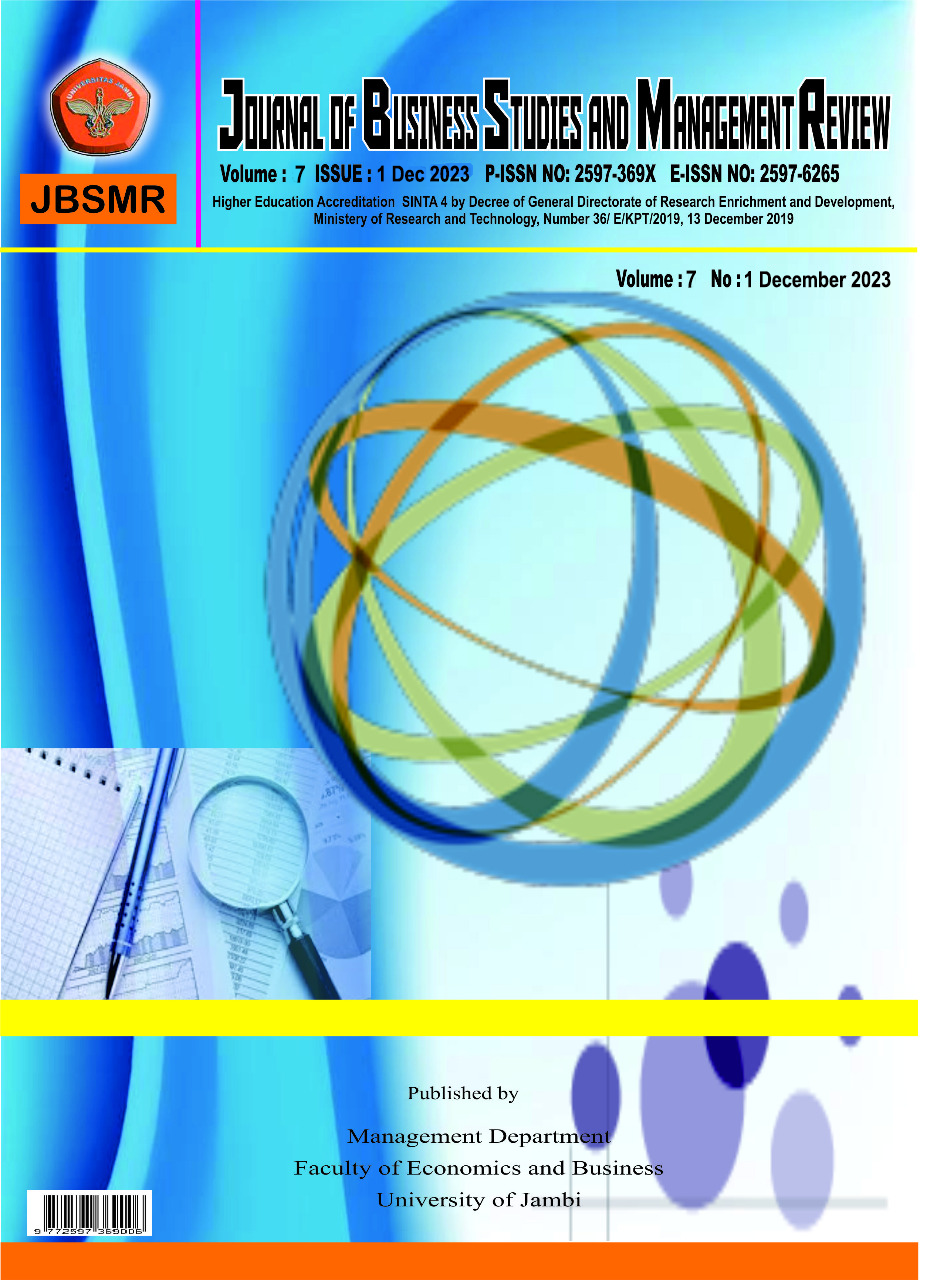DETERMINANTS OF SHARIA RETIREMENT FINANCIAL PLANNING MILLENNIAL GENERATION IN INDONESIA
DOI:
https://doi.org/10.22437/jbsmr.v7i1.29182Keywords:
Sharia Retirement Financial Planning, Financial Literacy, Financial Attitude, Clarity Of Retirement GoalsAbstract
The research was motivated by a phenomenon where many retirees in Indonesia could not enjoy a prosperous retirement, and some even had to continue working to meet their living needs. Based on this phenomenon, financial planning is very important for well-being in old age and needs to be done early when someone is still in their productive period. However, the millennial generation, as the largest population of productive age, does not yet have financial planning for retirement. In line with Indonesian society, which is predominantly Muslim, the goal of finance is not only for peace in this world but also in the afterlife. For this reason, the research aims to analyze the factors determining the millennial generation's Islamic retirement financial planning. The research method used is SEM-PLS with the variables studied including financial literacy, clarity of retirement goals, and financial attitudes as mediating variables. The research results show that financial literacy and clarity of retirement goals directly influence financial attitudes, but do not influence sharia retirement financial planning. Apart from that, financial attitudes also show that the results do not affect sharia retirement financial planning. Financial attitudes do not mediate the influence of financial literacy and clarity of retirement goals on Sharia retirement financial planning. The results of this research can be used as consideration for the government and pension fund companies in determining strategies and policies to improve the welfare of the Indonesian population.
Downloads
References
Badan Pusat Statistik. (2022). Jumlah Penduduk Pertengahan Tahun (Ribu Jiwa) 2020-2022. Diakses tanggal 29 Maret 2023. Retrieved from https://www.bps.go.id/indicator/12/1975/1/jumlah-penduduk-pertengahan-tahun.html
Badan Pusat Statistik. (2022). Sektor Formal Makin Mendominasi Penyerapan Tenaga Kerja di Jakarta. Diakses tanggal 29 Maret 2023. Retrieved from https://jakarta.bps.go.id/pressrelease/2022/11/07/991/sektor-formal-makin-mendominasi-penyerapan-tenaga-kerja-di-jakarta.html
Chelliah, P., Shanmugam, A., & Suang Sin, T. (2022). A Study on The Factors Impacting Retirement Planning Among Low-income Workers in The Northern Region, Malaysia. Journal of Entrepreneurship and Business, 10(2), 69–84. https://doi.org/10.17687/jeb.v10i2.928
Chen, Bingzheng, & Ze Chen. (2023). Financial Literacy Confidence and Retirement Planning: Evidence from China. Risks 11: 46. https://doi.org/10.3390/risks 11020046
Febrianto, Heru. (2021). Duh, 93% Pekerja Formal Belum Punya Perencanaan Dana Pensiun. Diakses tanggal 29 Maret 2023. Retrieved from https://ekbis.sindonews.com/read/379236/34/duh-93-pekerja-formal-belum-punya-perencanaan-dana-pensiun-1616940210
Goldman Sachs Asset Management. (2022). Retirement Survey & Insights Report 2022. Diakses tanggal 29 Maret 2023. Retrieved from https://www.gsam.com/content/gsam/us/en/institutions/market-insights/gsam-insights/2022/retirement-survey-insights-2022.html#section-none
Harahap, Subur, Armanu Thoyib, Sumiati Sumiati, and Atim Djazuli. (2022). The Impact of Financial Literacy on Retirement Planning with Serial Mediation of Financial Risk Tolerance and Saving Behavior: Evidence of Medium Entrepreneurs in Indonesia. International Journal of Financial Studies 10: 66. https://doi.org/ 10.3390/ijfs10030066
Kerdvimaluang, Narit. (2022). Financial Attitudes and Subjective Norms Influencing Retirement Planning. The EUrASEANs: Journal on global socio-economic dynamics, 1(32), 68-76.
Komalasari, F., & Mulyadi, R.Z. (2023). The Influence of Financial Literacy, Financial Attitude, and Peer Influence toward Retirement Saving Behavior Moderated By Gender: A Case in Indonesia. Journal of Economic Empowerment Strategy (JEES), 06(01), 27-40.
Kumankoma, E.S. (2023). Financial Literacy and Retirement Planning in Ghana. Review of Behavioral Finance, 15(1), 103-118.
Mahmud, M., Foziah, H., Ghaza, P., Nurfadzilah, N., Rashid, N., & Shukr, A. (2019). Islamic Wealth Management Towards Retirement Planning Among Private Sector Workforce in Malaysia. International Journal of Recent Technology and Engineering (IJRTE), 8(3), 7100-7103.
Margaretha, F., & Sari, S. (2015). Faktor Penentu Tingkat Literasi Keuangan Para Pengguna Kartu Kredit di Indonesia. Journal of Accounting and Investment, 132-144.
Mustafa, W.M.W.; Islam, M.A.; Asyraf, M.; Hassan, M.S.; Royhan, P.; Rahman, S. The Effects of Financial Attitudes, Financial Literacy and Health Literacy on Sustainable Financial Retirement Planning: The Moderating Role of the Financial Advisor. Sustainability 2023, 15, 2677. https://doi.org/10.3390/ su15032677
Otoritas Jasa Keuangan. (2022). Generasi Muda Sehat Finansial? Bisa!. Diakses tanggal 29 Maret 2023. Retrieved from https://sikapiuangmu.ojk.go.id/FrontEnd/CMS/Article/40776
Pankow, D. (2013). Financial Values, Attitudes, and Goals. North Dakota State University Fargo, North Dakota 58105. 4.
Park, H. & Martin, W. (2022). Effects of risk tolerance, financial literacy, and financial status on retirement planning. Journal of Financial Services Marketing, 27, 167–176. https://doi.org/10.1057/s41264-021-00123-y
Rizaty, Monavia Ayu. (2022). Jumlah Penduduk Muslim Indonesia Terbesar di Dunia pada 2022. Diakses tanggal 29 Maret 2023. Retrieved from https://dataindonesia.id/ragam/detail/populasi-muslim-indonesia-terbesar-di-dunia-pada-2022
Rosli, Norashikin bt. (2022). Determinant of Employee’s Retirement Planning: A Literature Review. Jurnal Kejuruteraan, Teknologi dan Sains Sosial, 8(1), 314-325
Safryani, U., Aziz, A., & Triwahyuningtyas, N. (2020). Analisis Literasi Keuangan, Perilaku Keuangan, Dan Pendapatan Terhadap Keputusan Investasi. Jurnal Ilmiah Akuntansi Kesatuan, 319-332.
Syamlan, Y., & Easti, R. (2020). Islamic Retirement Planning Among Indonesian Bankers. EQUILIBRIUM: Jurnal Ekonomi Syariah, 8(1), 25-40.
Yogasnumurti, R. R., Sadalia, I., & Irawati, N. (2020). The Effect of Financial Attitude and Financial Knowledge on Personal Financial Management of University Students Moderated by Gender. International Journal of Research and Review, 7(2), 649–657.
Yunus, Syarifudin. (2020). 86% Generasi Milenial Tidak Punya Program Pensiun, Kok Bisa?. Diakses tanggal 29 Maret 2023. Retrieved from https://pdplk.com/blog/86-generasi-milenial-tidak-punya-program-pensiun,-kok-bisa.html
Zhu, A.Y.F & Chou, K.L. (2018). Retirement Goal Clarity, Needs Estimation, and Saving Amount: Evidence from Hong Kong, China. Journal of Financial Counselling and Planning, 29(2), 328-342.
Downloads
Published
How to Cite
Issue
Section
License
Copyright (c) 2023 Nurul Hasanah, Ratna Juwita, Aprilia Nur Fitriana, Muthi'ah Rahmah Syahidah, Ricardo Marcell Dimas Djiwandono

This work is licensed under a Creative Commons Attribution 4.0 International License.

This work is licensed under a Creative Commons Attribution 4.0 International License.




.png)


